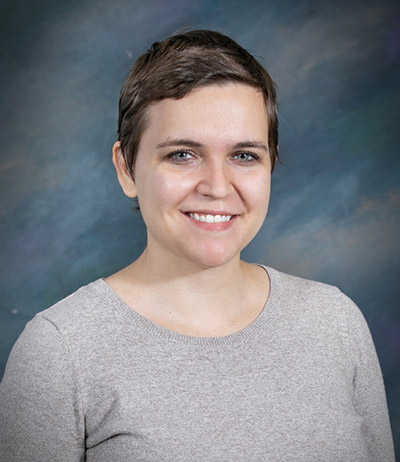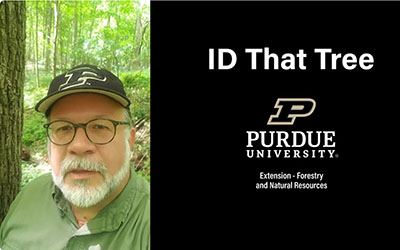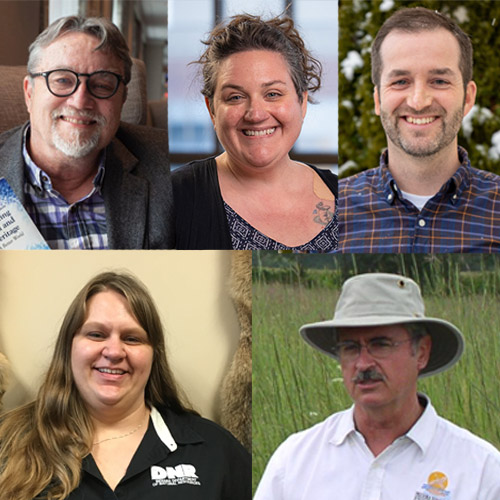Master's Student Erin Christian Earns ILMS Scholarship
Master’s degree student Erin Christian has been recognized by the Indiana Lakes Management Society with one of its 2022-23 scholarships.
Christian, who earned her bachelor’s degree in wildlife biology and rehabilitation from Lees-McRae College in 2017, is studying the effects of per- and polyfluoroalkyl substances (PFAS or forever chemicals) and hypoxia on midges in the Great Lakes in the Sepulveda ecotoxicology lab. She is advised by Dr. Marisol Sepulveda and Dr. Paris Collingsworth on her thesis titled “Midges as Bioindicators of Hypoxia and Emerging Contaminants.” Her research looks at hemoglobin expression changes pre-, during and post-hypoxia as well as PFAS contamination in field-collected midges.
 Christian works in collaboration with the U.S. Geological Survey office in Huron, Ohio, in conducting her field work. She plans to disseminate all data and information gathered during her research to help promote policies on PFAS production and waste management, which will in turn benefit lake and watershed management.
Christian works in collaboration with the U.S. Geological Survey office in Huron, Ohio, in conducting her field work. She plans to disseminate all data and information gathered during her research to help promote policies on PFAS production and waste management, which will in turn benefit lake and watershed management.
After completing her master’s degree, Christian aims to earn a teaching certificate and become a professor at a community college or small liberal arts college, where she would like to teach a basic biology or ecology course to get students, specifically in non-STEM majors, excited and interested in the sciences. She also hopes to continue research on aquatic health, including observational studies to monitor population dynamics and health.
In addition to impacting future generations as an educator, Christian also hopes to be a positive role model for other individuals with disabilities.
“It has been a bit of a struggle for me to integrate into the world of academia with a disability, but I would like to be proper representation to disabled others to prove that they too can be successful and contributing members of the scientific community.”
Christian has worked as a molecular laboratory technician in the Purdue Animal Disease Diagnostic Lab during two stints since March 2020, testing for a variety of animal diseases using real-time PCR and other molecular diagnostic techniques to diagnose a variety of diseases on small, large and exotic species. She received a Bravo Award from the College of Veterinary Medicine in 2020 for her contributions to the COVID-19 testing department as a molecular technician in the ADDL, carrying out hundreds of PCR tests during the pandemic.
Prior to coming to West Lafayette, Christian worked as a lab technician in the Veterinary Anatomy Lab in the Washington State University College of Veterinary Medicine (2018-19), where she created preserved cadavers, pro-sections, skeletal mounts and freeze-dried specimens of various animal species for use in education, anatomical understanding and practical application.
Previously, she worked in seasonal roles as a laboratory technician in the Purdue Department of Entomology (2011) and Department of Food Science (2013).
In addition to the ILMS scholarship, Christian will be granted an ILMS membership as well as a registration fee, travel and lodging stipend for the ILMS annual conference from March 8-10, 2023, in Bloomington, Ind.
The Indiana Lakes Management Society was incorporated as a not-for-profit corporation in Indiana in 1991 by a group of individuals with a common interest in protecting and saving Indiana lakes for future generations. ILMS aims to promote and encourage the understanding and comprehensive management of lakes and reservoirs and their watershed ecosystems. ILMS provides a forum and technical assistant network for information sharing; assists with development of lake restoration and protection programs, policies and legislation; and encourages local and statewide organization cooperation.
The ILMS scholarship is available to students who are enrolled in environmental science, aquatic ecosystem or watershed management courses at an Indiana college or university, with preferential consideration given to those who are planning to take classes related to aquatic ecosystems, especially at the core of an associate’s, bachelor’s or master’s degree program in biology, chemistry, environment science, natural resources, fisheries or aquatic resource management.






